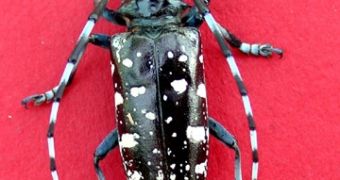Asian longhorned beetles have been a nuisance since they first arrived in the United States, some 11 years ago, onboard a ship carrying a contaminated crate delivered from China. The invasion that sprung up in Central Park caused the authorities to spend millions of dollars and cut thousands of trees just to eradicate the pest. Now, they somehow made their way to New England, where they threaten the state's maple industry and tourism.
Asian longhorned beetles act "subversively," by chewing their way into the bark of hardwood trees, such as poplar, sycamore, elm and maple, and then laying their eggs in those holes. Because the hatchlings are born inside the trees, regular pesticides have little to no effect on their numbers and the little beetles start tunneling through the tree, eventually exiting their "host" when they become adults.
Knowing what the beetles are capable of, New England authorities declared the outbreak a national emergency and mobilized all resources to counteract the spreading insects. Because it's very difficult to determine whether these creatures arrived in a certain area until the first adults are sighted, the trees that are identified as nests for the bugs are tagged for cutting. Hardwood trees housing these beetles can be easily recognized, because they resemble a firing range target, filled with holes.
Another advantage that these insects have over those trying to wipe them out is the recklessness of wood-cutters, who transport the wood for tens or hundreds of miles in all directions, without checking for any pests inside. A couple of adults are enough to gradually infest huge areas of forest, which will eventually be killed off by the intricate network of tunnels the bugs chew inside them. The only solution to save these areas is to cut down all infected trees and to wait for winter.
Cold temperatures kill off all the adults, and only then can the trees be cut down. Even under these extreme precautions, infestations can carry on the following year, if just a single infected tree is not cut and grinded, or burnt. The impact these measures have on the environment and the economy are extensive, especially if they develop in states that rely heavily on forest, such as New England.

 14 DAY TRIAL //
14 DAY TRIAL //